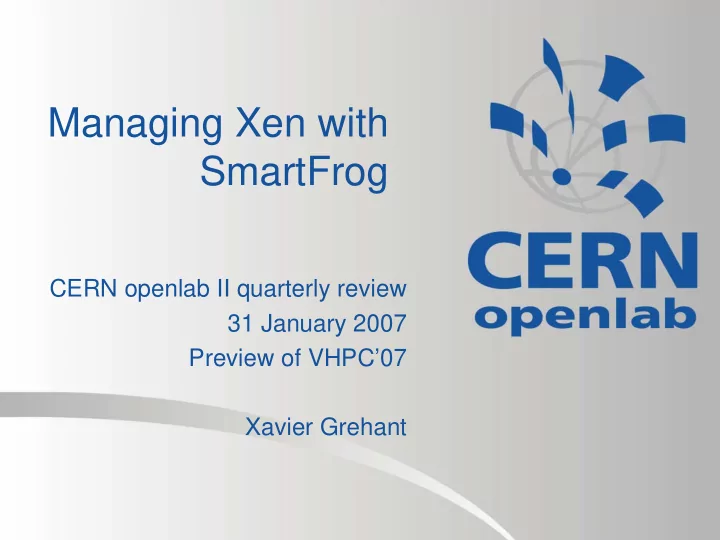

Managing Xen with SmartFrog CERN openlab II quarterly review 31 January 2007 Preview of VHPC’07 Xavier Grehant
Focus � On-demand execution environments must be: � Virtual � Distributed � Configurable � Composable � For batch jobs (grid) � In contrast to Virtual Workspaces, Tycoon � And software quality assurance (QA) tasks � In contrast to NMI builds & tests infrastructure CERN openlab presentation – 2007 2
Why virtual resource management? � Exploits benefits of virtual machines � Compatibility � Data isolation � Resource sharing and isolation � Virtualization results in much more flexibility � Xen enables automation � It does not provide the management system CERN openlab presentation – 2007 3
SmartDomains: Xen and SmartFog � Xen � High performance � Advanced features � Popularity � SmartFrog � Description language • Configure and choreograph components • Tree of components with attributes � Deamons • Peer-to-peer network for deployment � Deployment engine • Interprets description • Dispatches work to daemons • Liveness, dependencies, references CERN openlab presentation – 2007 4
SmartDomains: Xen and SmartFog � Xen VM deployment with SmartFrog � Users submit a description to launch the pool of VMs � SmartDomains automates deployment and management CERN openlab presentation – 2007 5
Usage: getting resource > sfStart localhost pool virtualPoolDesc.sf > sfTerminate localhost pool � Simplicity on/off required for batch computing � Other virtualization management systems: � Enterprise systems: • Platform VMO, Cassat Collage, OpenQRM, DynamicOE: Let admin define high-availibility policies among apps � Open source systems: • Enomalism, Virtual Workspace + GPE: interface to Xen VMM CERN openlab presentation – 2007 6
Usage: describing resource 7 CERN openlab presentation – 2007
Usage: describing resource 8 CERN openlab presentation – 2007
Usage: example 9 CERN openlab presentation – 2007
Usage: describing resource � Full configurability with base components attributes � Compared to: • Amazon EC2: same server, custom filesystem • Tycoon: same filesystem, custom resources � Lifecycle management with components composition � Never seen before (aknowledged as issue in Xen roadmap) CERN openlab presentation – 2007 10
Administering resources � Specially suited for trusted community (P2P) � A computer bootstraps whole resource � Security system follows same scheme � Predefine specialized components in description language � Extension mechanism, links � For specific usage, or simplicity of end-users descriptions � Or provide a web interface � Hide descriptions, fill up missing fields � Example: gLite testing CERN openlab presentation – 2007 11
Further enrich functionality and structure � Composite pattern: � Plug-in functionality • Scheduling, balancing, high-availability � Create higher-level structures • Virtual clusters Modularity and reuse � � Peer-to-peer Scope of an algorithm: the P2P network � • As opposed to Tycoon where bidding scope is inside a physical host No single point of failure � simpleScheduler extends Scheduler { hosts [|"host1", "host2", "host3"|]; } VMs2Dispatch extends Schedulee { scheduler LAZY ATTRIB simpleScheduler; - extends VM {...} } CERN openlab presentation – 2007 12
Conclusion � In the future, resource = VM � SmartDomains uniqueness � Batch jobs tests: on / off � Distributed: workflows and lifecycle management � Peer-to-peer � Composition � Applications: � Batch computing � QA tasks � Direct / specialized / enriched usage CERN openlab presentation – 2007 13
Recommend
More recommend